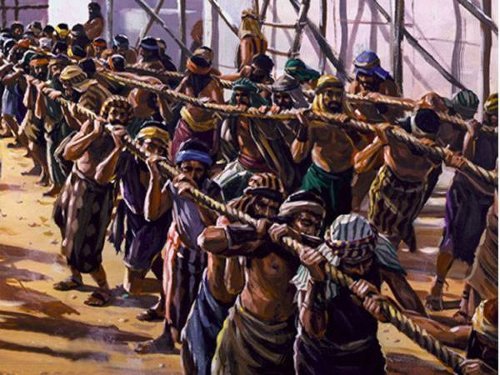#all newborn Hebrew males ordered slain
Explore tagged Tumblr posts
Text

The Israelites Are Treated Cruelly in Egypt
1:8 Then, a new king, who knew nothing about Joseph, came to power in Egypt. 9 He said to his people, “These Israelites are so numerous and strong that they are a threat to us. 10 In case of war they might join our enemies in order to fight against us, and might escape from the country. We must find some way to keep them from becoming even more numerous.” 11 So the Egyptians put slave drivers over them to crush their spirits with hard labor. The Israelites built the cities of Pithom and Rameses to serve as supply centers for the king. 12 But the more the Egyptians oppressed the Israelites, the more they increased in number and the farther they spread through the land. The Egyptians came to fear the Israelites 13-14 and made their lives miserable by forcing them into cruel slavery. They made them work on their building projects and in their fields, and they had no pity on them.
15 Then the king of Egypt spoke to Shiphrah and Puah, the two midwives who helped the Hebrew women. 16 “When you help the Hebrew women give birth,” he said to them, “kill the baby if it is a boy; but if it is a girl, let it live.” 17 But the midwives were God-fearing and so did not obey the king; instead, they let the boys live. 18 So the king sent for the midwives and asked them, “Why are you doing this? Why are you letting the boys live?”
19 They answered, “The Hebrew women are not like Egyptian women; they give birth easily, and their babies are born before either of us gets there.” 20-21 Because the midwives were God-fearing, God was good to them and gave them families of their own. And the Israelites continued to increase and become strong. 22 Finally the king issued a command to all his people: “Take every newborn Hebrew boy and throw him into the Nile, but let all the girls live.”
The Birth of Moses
2:1 During this time a man from the tribe of Levi married a woman of his own tribe, 2 and she bore him a son. When she saw what a fine baby he was, she hid him for three months. 3 But when she could not hide him any longer, she took a basket made of reeds and covered it with tar to make it watertight. She put the baby in it and then placed it in the tall grass at the edge of the river. 4 The baby's sister stood some distance away to see what would happen to him.
5 The king's daughter came down to the river to bathe, while her servants walked along the bank. Suddenly she noticed the basket in the tall grass and sent a slave woman to get it. 6 The princess opened it and saw a baby boy. He was crying, and she felt sorry for him. “This is one of the Hebrew babies,” she said.
7 Then his sister asked her, “Shall I go and call a Hebrew woman to nurse the baby for you?”
8 “Please do,” she answered. So the girl went and brought the baby's own mother. 9 The princess told the woman, “Take this baby and nurse him for me, and I will pay you.” So she took the baby and nursed him. 10 Later, when the child was old enough, she took him to the king's daughter, who adopted him as her own son. She said to herself, “I pulled him out of the water, and so I name him Moses.” — Exodus 1:8 - 2:10 | Good News Translation (GNT) Good News Translation® (Today’s English Version, Second Edition) © 1992 American Bible Society. All rights reserved. Cross References: Genesis 11:3; Genesis 15:13; Genesis 26:16; Genesis 41:1; Exodus 1:7; Exodus 6:16; Exodus 8:20; Exodus 15:20; Leviticus 25:43; 1 Samuel 1:20; 1 Samuel 2:35; Psalm 105:25; Jeremiah 34:9; Acts 4:18; Acts 7:20-21; Acts 17:18-19; Jonah 1:9; Hebrews 6:10; Hebrews 11:23-24
#Israel oppressed by a new king#all newborn Hebrew males ordered slain#birth of Moses#Moses is hidden#Moses placed in a basket and left in the reeds#Pharaoh's daughter rescues Moses#Exodus 1:8 through 2:10#Book of Exodus#Old Testament#GNT#Good News Translation#Holy Bible#American Bible Society
4 notes
·
View notes